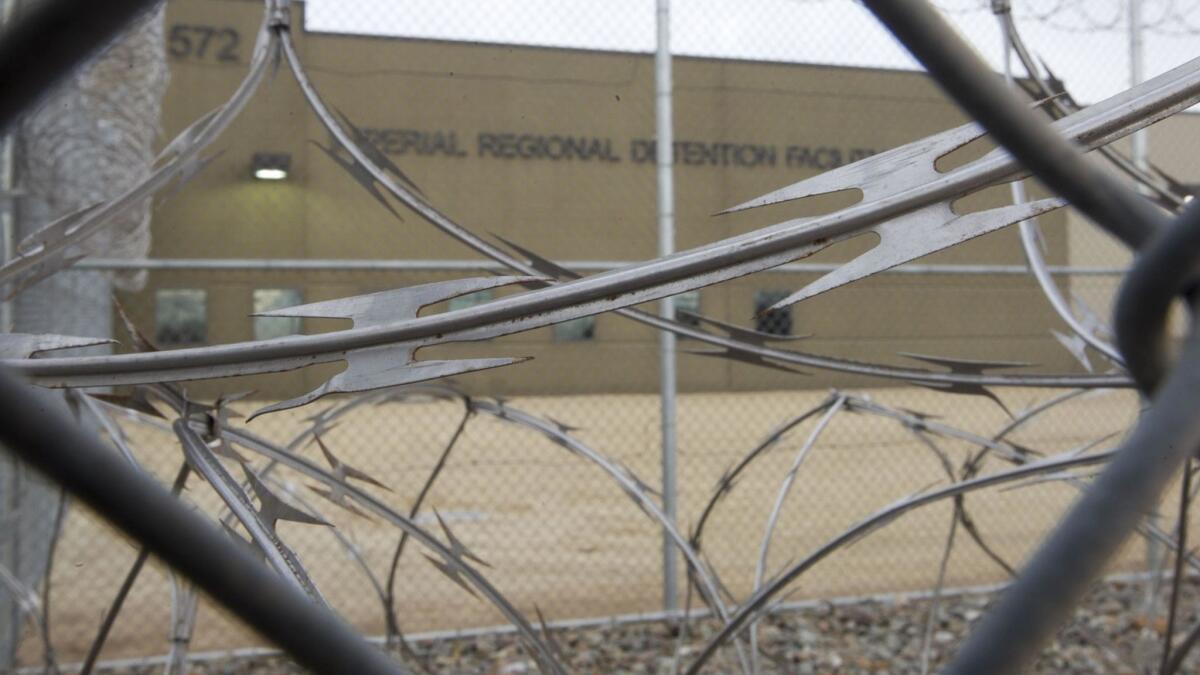Complaint alleges Calexico immigration detention officials use solitary confinement as retaliation

- Share via
SAN DIEGO — Immigration detainees at Imperial Regional Detention Facility say they have been placed in solitary confinement after speaking out about conditions there.
The allegation is among several in a complaint filed Tuesday with the Department of Homeland Security Office of Civil Rights and Civil Liberties through the help of a group of immigrant rights organizations. Detainees said in the complaint that staff at the facility, which is located in the Imperial County city of Calexico, falsified charges against them to send them to segregated housing units — or solitary confinement — after they filed grievances about staff behavior and facility conditions.
One detainee said that he faced retaliation after talking with officials from the DHS Office of Civil Rights and Civil Liberties about issues at the facility, and several detainees said they were disciplined after participating in a complaint about the facility’s air quality in January.
“We see the everyday cruelty of immigration detention. We see that folks speak up about it. We see that there’s retaliation for doing so and still people continue to resist and work toward shutdown,” said PJ Podesta of Innovation Law Lab, one of the organizations supporting the detainees.
Immigration and Customs Enforcement, the government agency responsible for immigration detention, and Management and Training Corp., the private prison company that runs the facility, did not respond to requests for comment.
Immigration detention is civil custody, so it is not supposed to be used for punitive reasons in the way that criminal custody is used. Detainees are often waiting for their immigration cases to progress through the court system.
Ramon Dominguez Gonzalez, who has been held at Imperial since January 2019 after being transferred from prison, has filed numerous grievances and complaints during his time at the facility, according to the complaint. That has also made him a target, the complaint says.
He has been in a segregated housing cell since June of last year, Dominguez Gonzalez told the San Diego Union-Tribune. He doesn’t know when he’s getting out. He said that hasn’t stopped him from speaking up.
“I would rather face the consequences than live the way that we’re living,” Dominguez Gonzalez said. “If somebody files a grievance, they’ll come and search people’s property, take people’s personal belongings. I just can’t live under those circumstances, so I’m going to continue to push and advocate against that type of stuff whether there’s retaliation or not.”
Part of his motivation, he said, is that many of the people held at Imperial have recently arrived in the United States. They do not know their rights and they do not speak English, making advocating for themselves difficult, he explained.
As someone who has been in the United States since he was a toddler, he feels that he’s in a position to advocate for better conditions. He is currently fighting to keep his green card to remain in the country.
In May 2021, Dominguez Gonzalez helped a fellow detainee write a grievance against a facility staff member. The employee later came to his cell and threateningly told him to stop helping people submit grievances, the complaint says. Dominguez Gonzalez submitted a grievance about this incident as well, and after reviewing video footage, facility staff found it to be true, the complaint says.
In the spring of this year, Dominguez Gonzalez went to see the facility’s dentist and requested a deep dental cleaning, which the complaint says he hadn’t received in more than three years during his time there. His request was declined, and he was escorted back to his unit. Later, he received a write-up that said he had refused to leave when his request was denied, according to the complaint.
The same employee who had threatened him presided over the disciplinary proceeding, and Dominguez Gonzalez ended up being sent to solitary confinement, the complaint says.
Now he feels like his mental health has suffered more than it did when he was in prison, he said.
A therapist evaluated Dominguez Gonzalez in July and found that he has post-traumatic stress disorder and post-release syndrome with symptoms that include difficulty sleeping, loss of appetite, difficulty concentrating and hyperawareness, the complaint says. The complaint attributes much of this to the amount of time that Dominguez Gonzalez has spent in solitary confinement.
“I didn’t have these issues before,” he said. “The last couple of years before I got out of prison I was doing good. I was adapting to go back out to society.”
The complaint also details the case of a detainee, Alvaro Galindo, who has spent more than 130 days in the segregation unit after arriving at the facility in January. That means he’s spent more than half of his time at the facility in isolation. As a result, the complaint says, Galindo’s health has deteriorated significantly.
“I was in a tough spot within myself, and the way they use solitary confinement here just helped to make that worse,” Galindo told the Union-Tribune. “No one in this facility, for whatever reason they’re here, should be subjected to that.”
The first time he was sent to solitary confinement, he was given 30 days because a guard threw away a bottle of soda that he was drinking, and he retrieved the bottle from a garbage can, the complaint says. The complaint notes that detainees are paid $1 per day for work at the facility, so getting a bottle of soda from the commissary is a luxury for them.
The second time, he was sent to solitary on charges of fruit possession and medication misuse that were ultimately determined to be unfounded, the complaint says, but while he waited for the disciplinary proceedings, he spent another 30 days in isolation.
The third time, Galindo was sent to the segregated housing unit after a fight with another detainee. Both were given 15 days, but then Galindo was held longer, for about 70 days, the complaint says. It notes that at the time, he had an open grievance against the official presiding over his disciplinary proceedings because that person had allegedly thrown away his personal photos.
Now he’s back in solitary for a fourth time, he told the Union-Tribune on Tuesday, for another 30-day sentence because of a contraband write-up. While he’s been in there, he’s seen other detainees get released from the segregated housing unit in a week or less for the same offense, he said.
“This is what I’ve come to accept as my reality, that in my time that I’m here, I’m going to be sent here for the most minor things and expect that I’m going to be given the fullest time possible,” Galindo said.
When he was most recently taken to solitary confinement, he said, he wasn’t given sheets or a blanket until his second night there. He didn’t have any of his belongings except the clothes he was wearing, and the cell was cold, he said.
“No one should have to be in these conditions,” he said.
The complaint also alleges that in some cases detainees did not receive adequate medical care as a retaliatory response to their speaking out. Donald Varela Fernandez, who has been at the facility since September 2021, participated in the January complaint about air quality inside the facility.
He told the more recent complaint authors that he believes the facility retaliated against him by withholding medical care until he had deteriorated to an emergency situation.
The complaint says he spent months trying to see a doctor at the facility because of increasing pain, decreased range of motion in his limbs and burning sensations in his hands and fingers.
The complaint says that Varela Fernandez was misdiagnosed with arthritis by a nurse practitioner even though a test for the condition came back negative. It took more than four months before Varela Fernandez was allowed to see a doctor, the complaint says. The next month, he was transported to the emergency department at a nearby hospital, which transferred him to UC San Diego Medical Center, where he had neurosurgery.
When he returned to Imperial, the complaint says, he was placed in a segregated cell that didn’t have enough space for him to do the physical therapy exercises he’d been given, and his discharge instructions were taken away. He was also prevented from attending a follow-up appointment in August, according to the complaint.
“It’s pretty horrific,” said Mariel Villarreal, a senior attorney with California Collaborative for Immigrant Justice who is representing Varela Fernandez in his request to get out of immigration custody.
Villarreal said she has seen similar issues at other detention facilities, as well as in the past at Imperial. That’s why the complaint includes a call for Congress to shut down immigration detention facilities entirely, she said.
“This is not a new tactic or a new issue that’s arisen at Imperial,” she said. “There is no humane or legal way to do this. That has been proven over and over again.”
Morrissey writes for the San Diego Union-Tribune.
More to Read
Sign up for Essential California
The most important California stories and recommendations in your inbox every morning.
You may occasionally receive promotional content from the Los Angeles Times.











